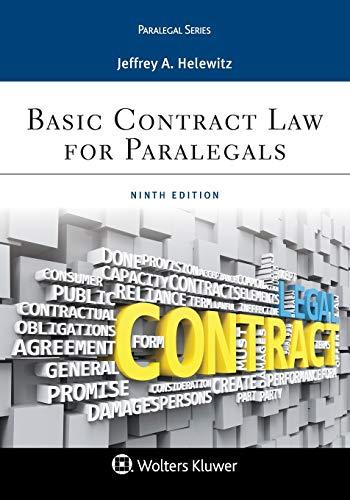From 1993 to 2002, Defendant William P. Shoemaker (Shoemaker) owned and operated a company known as Southeastern
Question:
From 1993 to 2002, Defendant William P. Shoemaker (‘‘Shoemaker’’) owned and operated a company known as Southeastern Rentals, which was an oil field related service company that rented wireline tools. Sometime around March of 2001, Shoemaker was approached by a representative of Southeastern Rental Tools & Supply, L.P. (‘‘STS’’), who discussed the possible sale of Southeastern Rentals to STS. Some time passed, and in approximately November of 2001, there were further discussions regarding the sale of Southeastern Rentals to STS. Pursuant to these discussions, Shoemaker was sent a ‘‘Letter of Intent’’ regarding the sale on or about January 2, 2002. Shoemaker took this letter to his attorney for review and response.
The letter of intent states, in part in Section 7 that, ‘‘Shoemaker’s employment agreement will also include certain noncompete provisions to be triggered should he leave the employment of STS.’’ On January 24, 2002, Dal Williamson, Shoemaker’s attorney, wrote to STS and, among other things, informed STS of Shoemaker’s disagreement with the noncompetition part of the proposed agreement. STS responded by letter dated January 25, 2002 and specifically stated that, ‘‘STS will amend the noncompete agreement to extend for two years after STS is no longer compensating William Shoemaker. If Mr. Shoemaker leaves STS employment at the end of his five-year contract, the two-year noncompete will be enforced. Should Mr.
Shoemaker terminate his employment within the five year contract period and compensation cease, the two-year noncompete will be enforced. This is consistent with STS employment policy.’’
Eventually, the parties agreed to terms and, on March 1, 2002, the parties closed the sale. As consideration for the sale of Southeastern Rentals to STS, Shoemaker was to be paid the sum of 1.5 million dollars. One of the closing documents was a Members Interest Purchase Agreement which contained a covenant not to compete as follows:
9.7 Covenant Not to Compete: During the period commencing on the Date of Closing and continuing until either the second anniversary of the Date of Closing or on the second anniversary of the termination of Seller’s employment by the Company, whichever occurs later, the ‘‘Noncompetition Period’’, the Seller shall not (and shall cause each Noncompetition Party (as defined below)
not to), directly or indirectly own, manage, operate or control or be employed by any business in competition with the business activities conducted by the Company on the Date of Closing or the date Seller is no longer an employee of the Company . . . .
As part of the closing, the parties also executed an Employment Agreement and a separate Noncompetition Agreement. The Noncompete Agreement contained a paragraph which stated that ‘‘the parties hereto intend this Noncompetition Agreement to supersede any other noncompete agreements previously entered into by the parties, whether such agreements are written or orally made.’’
The Employment Agreement provided for a primary employment term of five years, subject to earlier termination. On February 21, 2007, the plaintiff informed Shoemaker that his contract of employment ‘‘would not be renewed.’’ The plaintiff was very exact in its wording of this letter to make certain that Shoemaker’s contract was not being ‘‘terminated’’ but only nonrenewed.
According to the Complaint, immediately after his employment with STS ended, Shoemaker opened an office for Professional Wireline Rentals, LLC
(‘‘PWR’’), a Louisiana company engaged in oil field services in direct competition with STS. The plaintiff alleges that prior to March 1, 2007, PWR had no presence or office in the state of Mississippi, but that with Shoemaker’s help, PWR opened an office in Ellisville, Mississippi, literally right down the road from STS’s offices. The plaintiff asserts that since that time, Shoemaker has contacted and/or hired current and former employees of STS and that he has also contacted current and former clients of STS, solicited business, and performed work for these former or current clients of STS. On April 27, 2007, the plaintiff filed its Complaint requesting: (1)
injunctive relief from the court by prohibiting Shoemaker from competing against STS; (2) actual damages it has sustained as a result of Shoemaker interfering with business or contractual relations of STS; and (3) punitive damages; and (4) all expenses of litigation.......
Questions
1. What are the ambiguities identified by the court in the noncompete provisions?
2. What importance does the court place on the wording used in the termination letter?
3. How would you draft the provision, based on this decision, so as to avoid any ambiguity?
Step by Step Answer:






